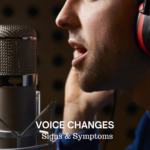Vision Changes: Understanding Causes, Symptoms, and Treatment
Vision is one of our most vital senses, allowing us to interact with and perceive the world around us. However, many people experience changes in their vision at some point in their lives. These changes can range from mild and temporary to severe and permanent. Understanding the causes, symptoms, and treatment options for vision changes is crucial for maintaining eye health and overall well-being.
Causes of Vision Changes
1. Age-Related Changes
As we age, our eyes undergo several changes that can affect vision. The most common age-related vision problems include:
- Presbyopia: This is the gradual loss of the eye’s ability to focus on nearby objects, commonly occurring after age 40.
- Cataracts: A condition where the lens of the eye becomes cloudy, leading to blurry vision. Cataracts are very common in older adults.
- Age-Related Macular Degeneration (AMD): A disease that affects the macula, the part of the retina responsible for sharp central vision, leading to loss of central vision.
2. Refractive Errors
Refractive errors occur when the shape of the eye prevents light from focusing correctly on the retina. The main types include:
- Myopia (Nearsightedness): Difficulty seeing distant objects clearly.
- Hyperopia (Farsightedness): Difficulty seeing close objects clearly.
- Astigmatism: A condition where the cornea or lens is irregularly shaped, causing blurred vision at all distances.
3. Medical Conditions
Several medical conditions can cause vision changes, including:
- Diabetes: Diabetic retinopathy is a complication of diabetes that affects the blood vessels in the retina, leading to vision loss.
- Hypertension: High blood pressure can damage the blood vessels in the retina, causing vision problems.
- Glaucoma: A group of eye conditions that damage the optic nerve, often associated with increased pressure in the eye, leading to vision loss.
4. Eye Infections and Injuries
Infections such as conjunctivitis (pink eye) or more severe infections like keratitis can cause vision changes. Injuries to the eye, whether from physical trauma or exposure to harmful substances, can also impact vision.
5. Neurological Conditions
Conditions affecting the brain or nervous system, such as multiple sclerosis or stroke, can lead to vision changes. These conditions can affect how the brain processes visual information or impair the nerves responsible for eye movement.
Symptoms of Vision Changes
Recognizing the symptoms of vision changes is essential for seeking timely medical attention. Common symptoms include:
- Blurry Vision: Difficulty seeing objects clearly.
- Double Vision (Diplopia): Seeing two images of a single object.
- Floaters: Small spots or shapes that float in the field of vision.
- Flashes of Light: Sudden flashes or streaks of light.
- Reduced Night Vision: Difficulty seeing in low-light conditions.
- Loss of Peripheral Vision: Reduced ability to see objects outside the direct line of sight.
- Eye Pain or Discomfort: Persistent pain, redness, or irritation in the eyes.
Diagnosing Vision Changes
If you experience any vision changes, it’s essential to consult an eye care professional. A comprehensive eye exam can help diagnose the underlying cause. During the exam, the eye doctor may perform several tests, including:
- Visual Acuity Test: Measures the sharpness of vision.
- Refraction Test: Determines the correct prescription for glasses or contact lenses.
- Slit-Lamp Exam: Allows the doctor to examine the structures of the eye in detail.
- Tonometry: Measures the pressure inside the eye, important for diagnosing glaucoma.
- Retinal Exam: Examines the back of the eye, including the retina, optic disc, and blood vessels.
Treatment Options
The treatment for vision changes depends on the underlying cause. Some common treatment options include:
1. Corrective Lenses
For refractive errors such as myopia, hyperopia, and astigmatism, corrective lenses (glasses or contact lenses) can provide clear vision. Presbyopia can be corrected with reading glasses or bifocal/multifocal lenses.
2. Medications
Medications may be prescribed to treat certain conditions causing vision changes. For example, eye drops can reduce intraocular pressure in glaucoma, while anti-inflammatory drugs can treat infections or inflammation.
3. Surgery
Surgical options are available for various eye conditions:
- Cataract Surgery: Involves removing the cloudy lens and replacing it with an artificial one.
- Laser Eye Surgery: Procedures such as LASIK or PRK can correct refractive errors by reshaping the cornea.
- Glaucoma Surgery: Procedures to improve fluid drainage from the eye, reducing pressure.
4. Lifestyle and Home Remedies
Certain lifestyle changes and home remedies can help manage vision changes:
- Healthy Diet: Consuming a diet rich in vitamins and minerals, particularly vitamin A, C, E, and omega-3 fatty acids, supports eye health.
- Regular Eye Exams: Routine check-ups can detect issues early and prevent vision loss.
- Protective Eyewear: Wearing sunglasses to protect against UV rays and safety glasses during activities that pose a risk to the eyes.
5. Managing Underlying Health Conditions
Controlling underlying health conditions, such as diabetes and hypertension, can prevent or minimize vision changes. Regular monitoring and appropriate treatment are crucial.
Preventing Vision Changes
While some vision changes are inevitable with aging, many can be prevented or minimized with proper eye care and lifestyle choices:
- Regular Eye Exams: Schedule comprehensive eye exams at least once a year, or as recommended by your eye care professional.
- Healthy Diet: Eat a balanced diet rich in fruits, vegetables, and fish to support eye health.
- Avoid Smoking: Smoking increases the risk of age-related macular degeneration, cataracts, and other eye conditions.
- Protect Your Eyes: Wear sunglasses to shield your eyes from UV rays and safety glasses when necessary.
- Manage Health Conditions: Keep chronic conditions like diabetes and hypertension under control to prevent vision-related complications.
Conclusion
Vision changes can significantly impact quality of life, but many issues can be managed or treated effectively with timely intervention. Understanding the causes, symptoms, and treatment options is crucial for maintaining good eye health. Regular eye exams, a healthy lifestyle, and proactive management of health conditions are key to preserving vision and overall well-being. If you experience any changes in your vision, don’t hesitate to seek professional medical advice. Your eyes are invaluable, and taking care of them should be a top priority.





